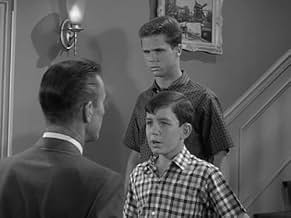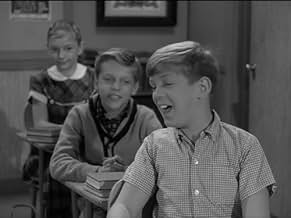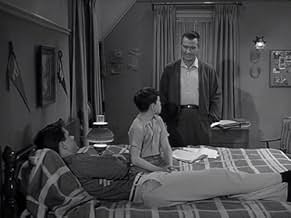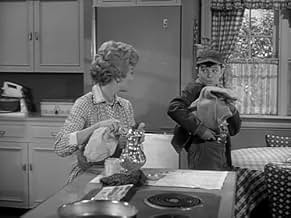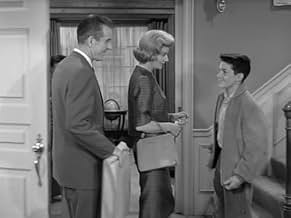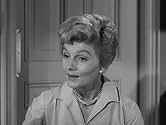Ajouter une intrigue dans votre langueThe misadventures of a suburban boy, family and friends.The misadventures of a suburban boy, family and friends.The misadventures of a suburban boy, family and friends.
- Nommé pour 2 Primetime Emmys
- 5 victoires et 4 nominations au total
Parcourir les épisodes
Avis à la une
Others have commented that "Leave It To Beaver" was not a true reflection of American life. Maybe they were not there. I was. When the series opened in 1957, I was seven years old, an exact contemporary of the Beaver character. I loved the show from the first episode. I used it as a forecaster of what I could expect to happen to me in the coming week. While I had no older brother, my other experiences were quite similar. There were in my class at school a "Larry Mundello", a "Judy Hensler", and many other characters who led me into mischief, then scattered, leaving me holding the bag. I remember the baby alligator ads in comic books, publishing a neighborhood newspaper (one issue), and getting caught climbing things I shouldn't have. My father went to the office, my mother tended to the housekeeping. Maybe my life wasn't typical, but it sure was real to me, and I relive it every evening with reruns of "Leave It To Beaver."
It is easy to criticize "Leave it to Beaver" today for being an overly romanticized look at family life in the late 50s/early 60s. Because, well, it is an overly romanticized look at family in the late 50s/early 60s. But so what? This is a well written, well acted sitcom. I love it for the show that it is and I don't worry about the more realistic show it could have been.
Ward and June Cleaver are raising two sons: Wally and Theodore, who everyone calls by the nickname "Beaver." (To answer an earlier reviewer, the nickname came from older brother Wally who couldn't pronounce "Theodore" when his little brother was born, instead pronouncing it "Beaver.)
Beaver is definitely not a Bart Simpson, constantly making trouble and outwitting his dad. No, Beaver is a kid who gets into trouble usually because one of his friends (Larry, Richard or Gilbert) talks him into it. It is then usually up to Ward to help straighten the situation out and gently but firmly teach Beaver the lesson to be learned.
Wally and June are equally as important. Wally is the older brother we all wish we had. And who else but June could look so perfect while fixing up a batch of our favorite cookies?
One of the biggest reasons why the show was popular then and is still popular today, however, is the supporting cast. Eddie Haskell. ("And might I add Mrs. Cleaver, that is a lovely blouse you are wearing.") Fred Rutherford. ("See you in the salt mines, Ward.") Larry Mondello. Miss Landers. Mary Ellen Rogers. Gus the Fireman. All have endured for more than 40 years and become permanent fixtures in our pop culture.
Overly romanticized? Sure. But so what. Years from now when people have forgotten almost all of the sitcoms airing today, The Beaver will still be bringing smiles to our faces.
Ward and June Cleaver are raising two sons: Wally and Theodore, who everyone calls by the nickname "Beaver." (To answer an earlier reviewer, the nickname came from older brother Wally who couldn't pronounce "Theodore" when his little brother was born, instead pronouncing it "Beaver.)
Beaver is definitely not a Bart Simpson, constantly making trouble and outwitting his dad. No, Beaver is a kid who gets into trouble usually because one of his friends (Larry, Richard or Gilbert) talks him into it. It is then usually up to Ward to help straighten the situation out and gently but firmly teach Beaver the lesson to be learned.
Wally and June are equally as important. Wally is the older brother we all wish we had. And who else but June could look so perfect while fixing up a batch of our favorite cookies?
One of the biggest reasons why the show was popular then and is still popular today, however, is the supporting cast. Eddie Haskell. ("And might I add Mrs. Cleaver, that is a lovely blouse you are wearing.") Fred Rutherford. ("See you in the salt mines, Ward.") Larry Mondello. Miss Landers. Mary Ellen Rogers. Gus the Fireman. All have endured for more than 40 years and become permanent fixtures in our pop culture.
Overly romanticized? Sure. But so what. Years from now when people have forgotten almost all of the sitcoms airing today, The Beaver will still be bringing smiles to our faces.
During a recent TVLand "Top 10 Characters You Love To Hate" special, a well-known (under 40) female actress was quoted as saying that she believed sneaky Eddie Haskell to be the only character in the show that she remembered for resembling "a real person".
Though I'll agree that Ward and June might come across at times as being unrealistically conservative (for example, their sitting at home in their Sunday best for no reason) her comment was something I found hard to understand, since, Beaver was known to be the first show of it's kind to explore such teen issues as, alcoholism, divorce, and troubled teens.
It seems that many viewers also do not understand the significance of Ward's frequent reference (often shown as his sad remembrance) to his own harsh encounters with his strict Father, who made a point of "taking him out to the woodshed" to let Ward know "just what his Father meant", and how Ward, as a Father himself, deciding that he would not do the same when teaching his own sons right from wrong.
While the conservative side of the show might be a bit too much for some, in the end there is nothing wrong with that behavior either - it's a far better lifestyle than what we see in today's world, where parents sometimes see their children as a liability rather than a blessing.
Those who regularly watch Beaver know that while the corn does sometimes grow high in Mayfield, the trueness of the show's stories is what makes Beaver the timeless show that many still enjoy almost a half century after it's debut.
Though I'll agree that Ward and June might come across at times as being unrealistically conservative (for example, their sitting at home in their Sunday best for no reason) her comment was something I found hard to understand, since, Beaver was known to be the first show of it's kind to explore such teen issues as, alcoholism, divorce, and troubled teens.
It seems that many viewers also do not understand the significance of Ward's frequent reference (often shown as his sad remembrance) to his own harsh encounters with his strict Father, who made a point of "taking him out to the woodshed" to let Ward know "just what his Father meant", and how Ward, as a Father himself, deciding that he would not do the same when teaching his own sons right from wrong.
While the conservative side of the show might be a bit too much for some, in the end there is nothing wrong with that behavior either - it's a far better lifestyle than what we see in today's world, where parents sometimes see their children as a liability rather than a blessing.
Those who regularly watch Beaver know that while the corn does sometimes grow high in Mayfield, the trueness of the show's stories is what makes Beaver the timeless show that many still enjoy almost a half century after it's debut.
Leave It To Beaver contains one of the most remembered families in TV history. Unforgettable characters like Beaver, Wally, Ward, June and Eddie made the show a household name. The success of the show could be its unique way of showing the world through the eyes of Theodore "Beaver" Cleaver. Each of the main characters played a role in the shows appeal. Beaver's bad grammar and innocent charm. Wally's "one-of-a-kind" wisdom for his younger brother. Ward's desire for his boys to always do their best and stay straight, and June always keeping things together. Today we remember the Cleaver's as the wholesome family form the 50's. Gee, that's the way Beav' would've wanted it.
Leave it to Beaver is one of the classic sit-coms of all time. It is timeless and has had meaning for every generation that has watched it since its inception. It is in that rare category of show that will be shown forever. Like "I Love Lucy" or "The Dick van Dyke Show", or "The Brady Bunch (although I call this one a cheap rip-off)", or "The Mary Tyler Moore Show"---THE BEAVER IS AMONG THE BEST OF THE BEST, completely watchable and understandable with concepts that are universal to all and can be understood across the years.
When my young children discovered it, valuable lessons were learned. We laughed at the "messes" Beaver got in, usually with the help of friends talking him into it. We all learned to trust our judgment and not be led into unnecessary trouble. If there was trouble out there Beaver would find it. Thanks to the Beaver, mine have had a little more trouble finding it than they might have otherwise. Lots of laughs and a lesson to be learned every show.
Please check my comments for "Still the Beaver", (a many years later continuation), and if you get the chance tune into it for some "Cleaver's: the next generation action". It was done with love and it was a wonderful job.
PS--I was surprised to learn (from the imdb info on 'beaver') that GWEN RUTHERFORD (fred's wife/lumpy's mom) was played by MAJEL BARRETT (RODDENBERRY) of later Star Trek fame. Live and learn.......
When my young children discovered it, valuable lessons were learned. We laughed at the "messes" Beaver got in, usually with the help of friends talking him into it. We all learned to trust our judgment and not be led into unnecessary trouble. If there was trouble out there Beaver would find it. Thanks to the Beaver, mine have had a little more trouble finding it than they might have otherwise. Lots of laughs and a lesson to be learned every show.
Please check my comments for "Still the Beaver", (a many years later continuation), and if you get the chance tune into it for some "Cleaver's: the next generation action". It was done with love and it was a wonderful job.
PS--I was surprised to learn (from the imdb info on 'beaver') that GWEN RUTHERFORD (fred's wife/lumpy's mom) was played by MAJEL BARRETT (RODDENBERRY) of later Star Trek fame. Live and learn.......
Le saviez-vous
- AnecdotesAlthough the series was still earning good ratings, its star, Jerry Mathers, wanted to retire from acting to focus on his education upon entering high school. As a result, it was agreed to halt production and the series became the first prime time American production to have a series finale.
- GaffesDuring season one, Wally was in 8th grade and Beaver was in 2nd - six years apart. By the end season six Beaver was finishing 8th grade and Wally was graduating high school - 4 years apart.
- Citations
June Cleaver: Wally, where are you going?
Wally Cleaver: I'm going over to slug Eddie.
June Cleaver: That's no way to talk, this is Sunday.
Wally Cleaver: You're right, I'll wait 'til tomorrow and slug him in the cafeteria.
- Crédits fousThe actor who plays "Beaver" is always credited at the beginning of the show as "And Jerry Mathers...as The Beaver".
- ConnexionsFeatured in Prime Times (1983)
Meilleurs choix
Connectez-vous pour évaluer et suivre la liste de favoris afin de recevoir des recommandations personnalisées
Détails
- Date de sortie
- Pays d’origine
- Site officiel
- Langue
- Aussi connu sous le nom de
- It's a Small World
- Lieux de tournage
- Sociétés de production
- Voir plus de crédits d'entreprise sur IMDbPro
- Durée30 minutes
- Couleur
- Mixage
- Rapport de forme
- 4:3
Contribuer à cette page
Suggérer une modification ou ajouter du contenu manquant





